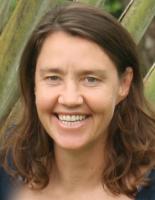
Mariée avec deux enfants
2011 Habilitation à Diriger des Recherches (HDR), EPHE
Evolutionary and behavioural ecology: Sexual selection and life-history traits
2001 PhD Evolutionary Ecology. University of East Anglia, U.K. Supervisor: Prof J.D. Reynolds.
Evolutionary ecology of the symbiosis between the European bitterling, Rhodeus sericeus, and unionid mussels
1996 MSc Evolutionary Biology and Ecology, University of Montpellier II, France.
2002-2006 Academy of Finland Post-doctoral fellow at Centre of Excellence, University of Jyväskylä, Finland (Prof. Tapio Mappes) and UC Santa Cruz, USA (Prof. Barry Sinervo).
2001-2002 John and Pamela Salter Trust Post-Doctoral Fellow, University of East Anglia, U.K.
1998-2001 NERC Ph.D. Fellow, University of East Anglia, U.K.
1997-1998 Research assistant, Ministry of Agriculture, Food and Fisheries (now CEFAS), Lowestoft.
Co-coordinator of Research Axe 2 within CRIOBE, USR 3278
ERASMUS Academic Coordinator between EPHE and University of Ulster, Ireland.
Partner University Fund Academic Coordinator between CRIOBE and University of Florida
Suzanne Mills is an evolutionary biologist exploring the role played by endocrinological mechanisms in enabling animals to cope with local and global anthropogenic environmental change. She uses an integrative approach to study the hormonal, behavioural, physiological, reproductive and ageing responses of animals to environmental changes. She studies how historical stressors may have shaped current responses, specifically the developmental plasticity of the stress response as a function of during which life-stage (pre- and post-natal, adolescence, adulthood) an environmental stressor was experienced. Research in her group is mainly in situ and ranges from the responses of coral reef fish to environmental stressors including temperature-induced bleaching, boat noise and artificial light at night, through work on artificial tourism-related feeding on shark endocrinology and growth, to the impacts of ocean acidification and elevated temperature on chemical communication and behaviour within a marine trophic cascade. She has also investigated the underlying mechanisms (including life-history trade-offs, sexual conflict and genotype by environmental interactions) to explain the maintenance of phenotypic and genetic variation in male reproductive traits in small mammals and lizards.
Impacts of ocean warming on anemonefish – hormonal & physiological responses and acclimation:
Norin, T., Mills, S.C., Killen, S. & Beldade, R. 2018. Anemone bleaching increases the metabolic demands of symbiont anemonefish. Proceedings of the Royal Society of Lond B 285: 20180282 (IF = 4.823).
Beldade, R., Blandin, A., O’Donnell, R. & Mills, S.C. 2017 Cascading fitness effects of anemone bleaching on associated anemonefish hormones and reproduction. Nature Communications 8: 716; DOI: 10.1038/s41467-017-00565-w (IF = 12.12).
Mills, S.C., Beldade, R., Chabanet, P., Bigot, L., O’Donnell, J. & Bernardi, G. 2015. Ghosts of thermal past: reef fish exposed to historic high temperatures have heightened stress response to further stressors. Coral Reefs 34: 1255-1260 (IF = 3.88).
Marine gastropods: Chemical communication and impacts of ocean warming and acidification:
Horwitz, R., Jackson, M. & Mills, S.C. 2017. The embryonic life-history of the tropical sea hare Stylocheilus striatus (Gastropoda: Opisthobranchia) under ambient and elevated ocean temperatures. PeerJ 5:e2956 (IF = 2.18).
Armstrong, E.J, Allen, T., Beltrand, M., Dubousquet, V., Stillman, J.H. & Mills, S.C. 2017 Interactive effects of ocean acidification and warming on the development and physiology of a mollusc, the blue-ring sea hare, Stylocheilus striatus. Marine Biology 164: 107 (IF = 2.375).
Bornancin, L., Bonnard, I., Mills, S.C. & Banaigs, B. 2017 Chemical mediation as a structuring element in marine gastropod predator-prey interactions. Natural Products Report 34: 644-676 (IF = 10.98).
Boat noise impacts on marine organisms – fitness responses and the role of hormones:
Nedelec, S.L., Mills, S.C., Nedelec, B., Lecchini, D., Simpson, S.D. & Radford, A.N. 2016 Repeated exposure to noise increases tolerance in a coral reef fish. Environmental Pollution 216: 428-436 (IF = 4.84).
Nedelec, S.L., Radford, A.N., Simpson, S.D., Nedelec, B., Lecchini, D. & Mills, S.C. 2014 Anthropogenic noise playback impairs embryonic development and increases mortality in a marine invertebrate. Scientific Reports 4: 5891 (IF = 4.259).
Mechanisms maintaining genetic and phenotypic variation in male reproductive traits:
Mills S.C., Koskela, E. & Mappes, T. 2012 Intralocus sexual conflict for fitness: sexually antagonistic alleles for testosterone Proceedings of the Royal Society of Lond B 279: 1889-1895 (IF = 5.68).
Mokkonen, M., Kokko, H., Koskela, E., Lehtonen, J., Mappes, T., Martiskainen, H. & Mills, S.C. 2011 Negative frequency-dependent selection of sexually antagonistic alleles in Myodes glareolus Science 334(6058): 972-974 (IF = 31.4).
Mills S.C., Alatalo, R.V., Koskela, E., Mappes, J., Mappes T. & Oksanen T.A. 2007 Signal reliability compromised by genotype by environment interaction and potential mechanisms for its preservation. Evolution 61-7: 1748-1757 (IF = 5.66).

